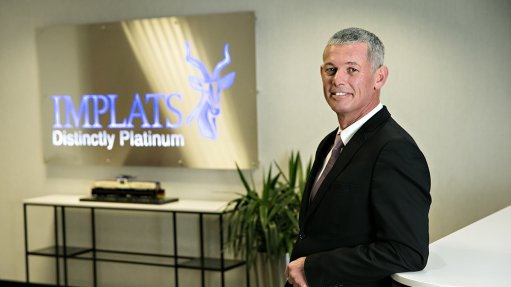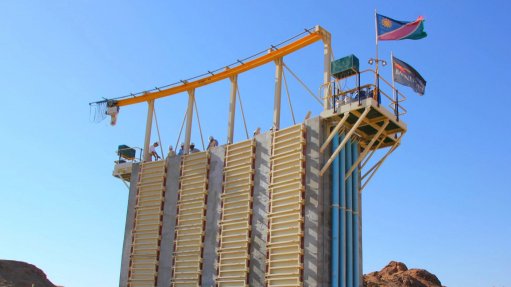Embedded generation threshold increase drives PPAs
Increasing the threshold for embedded projects has been the biggest positive policy change in unblocking private power purchase agreements (PPAs) and stimulating South Africa’s energy transition, says financial institution Nedbank Corporate and Investment Banking (CIB) energy finance head Amith Singh.
He explains that the policy change has enabled private parties to directly purchase power from independent power producers (IPPs). Further, the policy change has also enabled South African corporates to procure large-scale renewable energy directly from independent power producers (IPP) which is wheeled through South Africa’s transmission and distribution networks.
Overall, this change has served as a springboard for an upsurge in private projects, driving innovation and investment in the renewable-energy sector, he says.
He reiterates that a significant benefit of embedded electricity solutions is their ability to provide businesses with cost-effective renewable-energy power. By reducing reliance on traditional utilities and purchasing power directly from IPPs, companies can also refine their cost structures and achieve long-term savings. This is achieved through reduced tariffs, including wheeling charges and increments tied directly to the consumer price index (CPI).
“With the large volume of renewable energy required for South Africa’s energy transition, we need both Eskom and the private sector to procure these green electrons on a large scale for the next decade,” says Singh.
Previously, Eskom procured South Africa's renewable-energy projects through the renewable energy independent power procurement programme (REIPPP). In this programme, Eskom was the primary buyer, and all PPA payments were backed by guarantees from the National Treasury.
However, South African corporates now directly purchase renewable energy and the government can use those limited guarantees more efficiently. This is particularly significant for South African companies given the fiscal constraints the government is experiencing, as well as the limited and constrained grid capacity.
Singh suggests that by allowing corporates to source renewable energy directly from IPPs, the government could prioritise introducing a procurement programme for grid expansion using a public-private partnership (PPP).
In this arrangement, the private sector would build, own, operate, and eventually transfer the grid infrastructure, similar to the REIPPP programme, with the government ensuring private sector involvement in grid expansion, he says.
“Enabling private companies to buy their own green power from IPPs indirectly unblocks that space, which relieves government from giving guarantees for generation and channels these guarantees to grid infrastructure expansion; we can get more electricity generation into the country while the government focuses its limited resources on the grid,” he says. “Corporate South Africa is now prepared to issue the required guarantees from their own balance sheets to the IPPs for their green energy procurement.”
Challenges
A significant challenge withing the private- sector generation solutions industry is that most companies are uncomfortable with signing long-term PPAs, such as 20-year agreements. However, he notes that newer aggregators offer more flexible PPA terms, as well as the ability to sign-off on guarantees, assuring IPPs that they will be compensated for the power that they procure.
Additionally, a challenge in building renewable-energy projects is that IPPs often cannot get access to the grid. As a result, projects cannot reach financial close within their planned timelines, which delays construction and their potential to generate electricity.
However, Singh is optimistic that this will improve as the demand for private solutions increase, which will push the development of increased grid capacity. Further, he explains that public-private partnerships should be pursued to increase grid capacity.
“We need a financing mechanism for State-owned power utility Eskom to get private sector investment into the grid and allow them to [expand] the grid and enhance efficiency at a faster rate.”
He enthuses that doing so will offer significant benefits for South Africa and its economic development, including enabling the implementation of larger renewable-energy projects.
Despite these challenges, Singh commends the positive regulatory frameworks in place, which have facilitated the adoption of private sector electricity solutions. He explains that licences for traders and aggregators are now more accessible, and Eskom has provided clear rules for grid access and connection points. He has also seen Eskom issuing the necessary grid connection agreements for the projects that Nedbank CIB is closing.
While challenges remain, such as the need to build more substations and transmission lines, Singh believes that the country is moving in the right direction towards an energy transition and energy security.
Singh highlights the institution’s commitment to supporting the transition to green energy “goes all the way to Nedbank’s executive leadership and their board”. Nedbank CIB is actively involved in financing a large portfolio of energy projects across the value chain, including financing contractors and equipment.
“South Africa is still a very attractive destination for IPPs and it is this private sector investment that will make the energy transition a reality and will provide greatly to South Africa’s energy security,” he concludes.
Comments
Press Office
Announcements
What's On
Subscribe to improve your user experience...
Option 1 (equivalent of R125 a month):
Receive a weekly copy of Creamer Media's Engineering News & Mining Weekly magazine
(print copy for those in South Africa and e-magazine for those outside of South Africa)
Receive daily email newsletters
Access to full search results
Access archive of magazine back copies
Access to Projects in Progress
Access to ONE Research Report of your choice in PDF format
Option 2 (equivalent of R375 a month):
All benefits from Option 1
PLUS
Access to Creamer Media's Research Channel Africa for ALL Research Reports, in PDF format, on various industrial and mining sectors
including Electricity; Water; Energy Transition; Hydrogen; Roads, Rail and Ports; Coal; Gold; Platinum; Battery Metals; etc.
Already a subscriber?
Forgotten your password?
Receive weekly copy of Creamer Media's Engineering News & Mining Weekly magazine (print copy for those in South Africa and e-magazine for those outside of South Africa)
➕
Recieve daily email newsletters
➕
Access to full search results
➕
Access archive of magazine back copies
➕
Access to Projects in Progress
➕
Access to ONE Research Report of your choice in PDF format
RESEARCH CHANNEL AFRICA
R4500 (equivalent of R375 a month)
SUBSCRIBEAll benefits from Option 1
➕
Access to Creamer Media's Research Channel Africa for ALL Research Reports on various industrial and mining sectors, in PDF format, including on:
Electricity
➕
Water
➕
Energy Transition
➕
Hydrogen
➕
Roads, Rail and Ports
➕
Coal
➕
Gold
➕
Platinum
➕
Battery Metals
➕
etc.
Receive all benefits from Option 1 or Option 2 delivered to numerous people at your company
➕
Multiple User names and Passwords for simultaneous log-ins
➕
Intranet integration access to all in your organisation


















